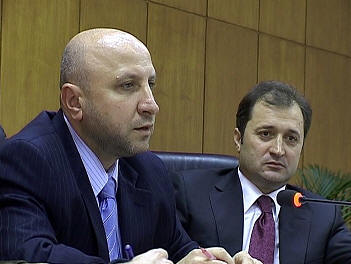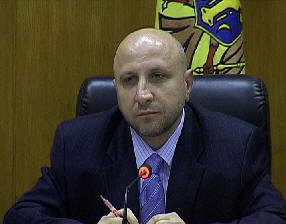At the conference, the officials announced the results of
the negotiations between Moldova's government and IMF
mission. Thus, the sides reached a preliminary agreement on
a new economic programme which sees a financial support
worth about 590 million dollars for Moldova till 2012. The
officials also agreed that, in the immediately next period,
Moldova will be able to use another 180 million dollars to
finance the budgetary needs.
The prime minister stressed the importance of the concerned
agreement. He emphasized the specific context in which the
talks were held, and said that the de-blocking of the
relations with the foreign creditors is a vital necessity
for Moldova in such a situation. "Moldova was affected both
by the world economic and financial crisis, and by the
previous government's inability to undertake proper actions
to diminish the impact. Thus, in the first half of 2009, the
balance of payments had a deficit of 556 million dollars,
the Gross Domestic Product (GDP) dropped by 7.8 per cent,
the current account decreased to 11.2 per cent of the GDP,
the public revenues diminished by ten per cent against the
same period of 2008, the budgetary expenses increased 13 per
cent before the elections, the forecasts of the annual
budget deficit reached 16 per cent of the GDP, and dropped
to 9.5 percent now," Vladimir Filat specified.
The prime minister also said that the consensus got in the
negotiations with IMF is important also by the fact that it
represents a signal received by the foreign donors and
potential investors. In this respect, the government assumes
responsibility to promote measures of economic re-launch and
stabilisation to improve the economic indexes, carry out
important structural reforms which will unchain the economic
processes.
The government plans to reduce the number of the categories
of goods subjected to obligatory certification and
licencing and other types of authorisations imposed to
business activity, implement a single desk without
interferences on behalf of the governmental agencies which
have no connection with this process, modernise the legal
framework to authorise constructions in order to reduce the
duration and number of related procedures to get permit for
construction, simplify procedures of starting and
liquidating business, simplify the procedure of fiscal
reporting by promoting the use of e-declarations.
Referring to the social dimension of the agreement's
conditions, discussed with the IMF mission's experts, the
prime minister said: "More speculations were made on alleged
social requirements of the IMF, which could have affected
some categories of residents. I avail myself of this
occasion to make certain specifications: there will be no
salary cuts; the general quota of the value-added tax (VAT)
will not be increased; there will be no redundancies, the
present retirement age is not scheduled to be changed, and
the 24-per cent salary increases for teachers will be
preserved and further applied."
At the same time, under the agreement, a string of measures
are to be undertaken to optimise the number of employees in
the budgetary sector. Speaking on this issue, Vladimir Filat
specified that, in 2010, the making redundant of a surplus
of 4,000 units in the budgetary sector will be, in fact, the
enforcement of a decision passed by the previous government.
Earlier, Moldova's government has assumed certain
commitments in this respect, and namely: to gradually reduce
the number of employees in the budgetary sector - by 3,000
units in 2008, 3,000 units in 2009 and 4,000 units in 2010.
Official data show that, in 2008, 3,200 people were made
redundant, and in the first half of 2009 - 1,663.
A reform of the pension supply system will follow, in line
with the established policies. The clauses staying at the
basis of achieving this goal include the following: the
privileges seen for the civil servants, judges and
prosecutors will be gradually removed starting from 2010, in
case of early retirement through the increase of the
retirement age by six months annually till reaching the
standard retirement age; the obligation to pay the social
insurance contributions will be extended so as to comprise
all the people employed in Moldova, in line with the
bilateral agreements, the mechanism of guaranteeing the
right to allowances for temporary labour inability will be
improved till 2011.
To reduce the impact of the recession on the most vulnerable
segments of the residents, the government is set to
consolidate efforts to implement a new social assistance
system. The allocations for social assistance, including the
payments for unemployment, will amount to 630 million lei
within the new system in 2010, which is by 40 per cent more
against 2009.

Among the principal measures of increasing the budget
revenues, which the government plans to apply, the prime
minister mentioned: increase of the quotas of excises to a
string of goods, including petrol, tobacco products,
cosmetic goods, luxury vehicles, etc., so as to get them
closer to the quotas applied in the neighbour countries, as
well as in accordance with the European Union's standards.
This will increase the revenues by about 500 million lei
(0.8 per cent of the GDP) in 2010; reintroduction of the tax
on the legal entities' incomes by applying a single
ten-percent quota on a wide and uniform basis while
comprising all the sectors and regions. At the same time,
the prime minister sent a clear-cut message to the business
circles as regards the preservation of the legal entities
income tax at the zero quota till 2012, so as to not to
increase the fiscal burden on the economic agents in the
crisis period.
"This agreement is favourable for Moldova, and offers clear
opportunities to the country. Moldova has completely another
prospect starting from this moment," the prime minister
said.

For his part, the head of the IMF mission, Nikolai
Gueorguiev, welcomed the government's commitment to restore
the fiscal and budgetary, as well as the external viability,
maintain the financial stability and support he economic
growth fostered by investments.
The programme aims at inverting the tendencies of increase
of the fiscal and budgetary lack of balance, which showed
themselves in late 2008 and during 2009, as well as at
increasing the budgetary spending for investments and social
protection.